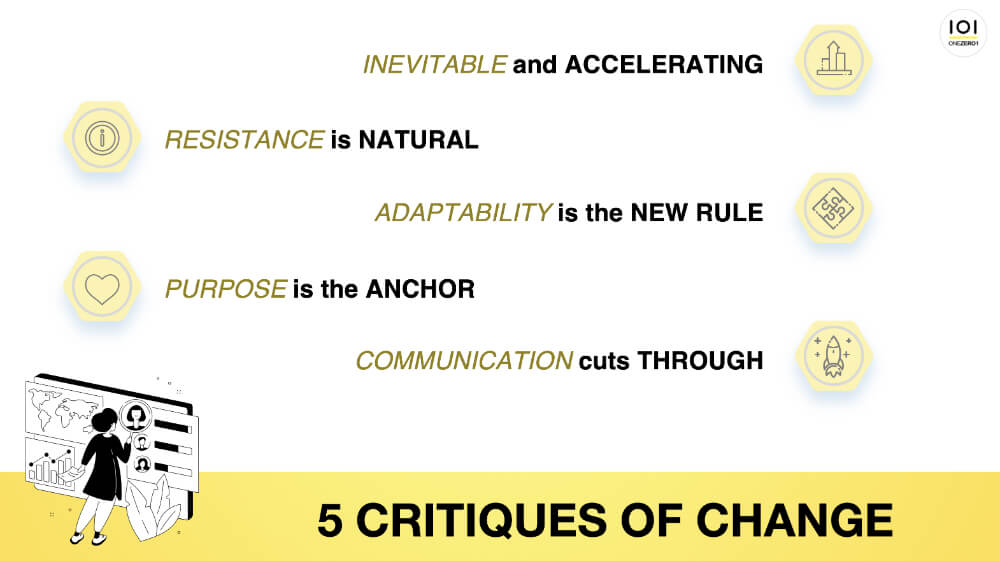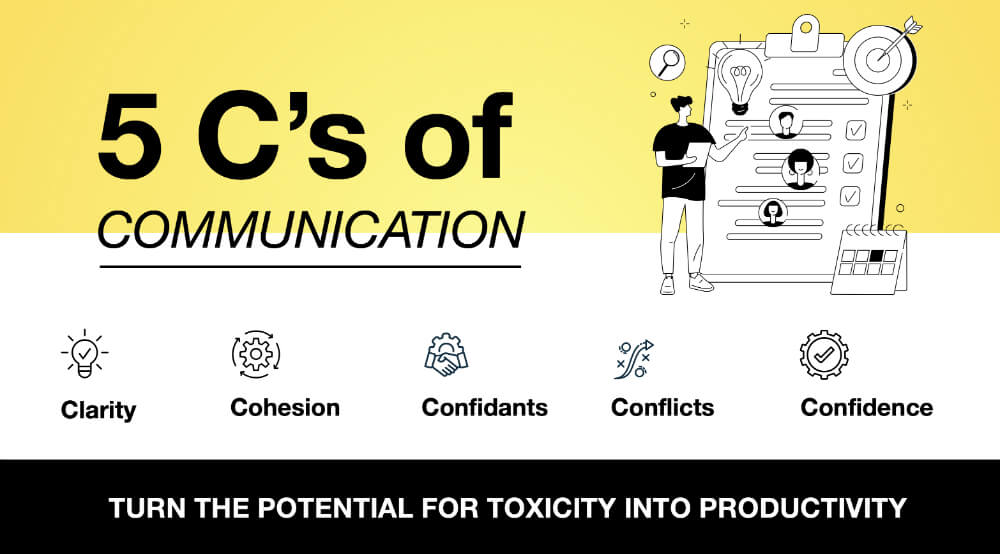In a world where change is the only constant, understanding and navigating through it is a table stake for both individuals and organisations. But we find change hard, and it is perhaps the most consistent, and gnarly business dynamic of our time. The following insights aim to demystify the complexities of change, offering a distilled perspective on how to not just survive but thrive in an ever-evolving and increasingly accelerating landscape. Drawing from personal experiences, I present five core critiques to guide us through this relentless tide of transformation

The 5 Core Critiques of Change
- Change is inevitable and accelerating – humans are hardwired to improve their existence, and harness the tools and resources around them to do so. We have done this since our genesis. Technologies, materials and knowledge have been the lightening conductors, and along with the desire to embellish, they have propelled humans in an ever-continuing upward momentum. But because of the exponential growth in technologies that has emerged through the Industrial Revolutions, change is no longer linear. We are witnessing an ever-fastening velocity. This is why we feel that it’s revolution and not evolution, and what’s more we may only be at the very beginning of the very start (see Ray Kurzweils Law of Accelerating Returns for more)
- Resistance is Natural – protecting what you hold is the foothill of betterment. We innately know the fragility of prosperity, we are hardwired to protect it and we put great store in the effort dispelled to win what we have won. So as we are coded to drive onwards and upwards, the potential of going backwards is a fundamental threat to our very endeavours – the emergence of such prospects draws out therefore the most primal of responses. Acknowledging this, and allowing time and discovery as to the potential or inevitability of change, is the only means to soothe this most natural state of anxiety and defence
- Adaptability is the new rule – people, organisations and society have thus far navigated much change, and why wouldn’t they. They have forged it for progress and prosperity, if we by and large accept that the total sum of the world is on a trajectory of advancement. The delineation between necessity and discretion is important however. Change is often seen as necessary, in response to factors out of our control, and therefore an imposed consumer of time and resources than we otherwise intended. Hence forced change is most often experienced as a negative. But for those that are in the mode of harnessing it, using it to their advantage, and understanding it can be a catapult of competitive advantage – they are the champions of and benefactors from change. They understand that embracing the new is the means to creating the new – creating propositions, value and an edge against the rest (see Nassim Taleb’s Antifragile and the many cited cases such as Amazon for more)
- Purpose is the anchor – becoming the champion of change, and using it to get ahead is an attractive proposition, but with it comes the weight of choice and complexity. Innovation, the ultimate manifestation of change mastery, necessitates forecasting, creative design and investment in the unknown. Without discipline and a means to guide the endeavour, it is easy to get lost in the malaise and meander down pathways of loss and discontent – Google Glasses anyone!. Navigating innovation and all change for that, in the storm of ever increasing choice and acceleration, requires an anchor. A touch stone that guides decision making, but also to rally and command human emotion and endeavour with the end point being to release fear and embrace discretionary effort
- Communication cuts through – all change, at least as we know it today in a pre-Artificial General Intelligence world, is human driven. In an organisational setting, to be purpose-driven, adaptable and set up to thrive, the general human intelligence needs to be courted and guided through the resistance and choices we have referred to. Process and participation are key, and in my experience these are the 5 C’s of Success:
- Clarity – a shared understanding of the why, the what and how change can either be a necessity and a risk, but also a catalyst for betterment is not just nice to have, but a must. Most often it’s in fact both necessary and opportunistic, and time and dialogue are the means to help ourselves hear, understand and process a rationale rather than emotional response to embracing it
- Cohesion – discussions and appraisals are then required to forge joined up thinking on the choices to be made, to help decisions to be taken and plans of action to be forged. This arc of choice to commitment is how we translate potential to value
- Confidants – through an open and honest discourse across the community implicit to perpetually assess progress and course-correct, understanding can be unified and allies are built while at the same time sense can prevail. This helps to preserve cognitive load and resources, without which success is often stymied, or certainly made all the harder. But it also builds trust and chemistry, as well as common purpose and friendships who are always much needed when the going gets tough
- Conflicts – confidants are better placed to resolve the inherent and necessary conflicts that will emerge from choice-making and re-routing. This is a matter of course in change management, and debacles should be dealt with through a mindset of problem-solving and triage – not blame and failure. Learning and the mitigation of potential loss as opposed to lamenting and reflection should be the discourse
- Confidence – belief in the venture and the intent (the Purpose) and the team is essential, without which cracks will emerge and failure rates amplify. Allowances for the human factors such as fear and resistance are important in that regard. Building confidence around the fact that a lack of confidence will often emerge, and drawing on resolute ambitions and logic as the antidote to inevitable friction can be a saving grace

The Rub
Change is hard, change is necessary, and change is ultimately the pursuit of being better. Change is also positive, if designed and executed with empathy and calculated intent, for it has been the pursuit of humankind since origin, and the dynamic that has led to our prosperity and supremacy as a species. But we find it so hard, stressful and inconvenient when confronted with it. This is the dichotomy we deal with – but like most things, it’s a matter of perspective. See it as a boon, and it will be – see it as an hurdle, and that it will be also. The trick is to turn the potential for toxicity into productivity. Fortune favours the brave, and the brave embrace change – or perhaps we should say favour is the fortune of change mastery

